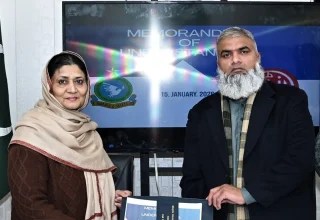
Federal Minister for Maritime Affairs Muhammad Junaid Anwar Chaudhry announced that a national action plan is being prepared in consultation with stakeholders to protect vulnerable shark species in the Arabian Sea. In a statement on Saturday, the federal minister highlighted the government’s commitment to sustainable marine practices and meeting global conservation standards.
Junaid Chaudhry pointed out that the continued catching of banned sharks, including requiem, hammerhead, thresher, mackerel, and whale sharks, threatens both marine biodiversity and Pakistan’s international conservation commitments.
The minister highlighted that the Basking Shark, a highly migratory species in the Arabian Sea, is classified as endangered on the IUCN Red List. This species is particularly vulnerable to human threats like fishing net entanglement and boat collisions, worsened by its slow growth and low reproduction rates.
The federal minister stressed that urgent, well-planned action is needed to protect the country’s marine ecosystem. He warned that ongoing unsustainable fishing practices involving these species could harm not only the environment but also seafood trade by damaging the country’s international reputation.
The minister said the Food and Agriculture Organization (FAO) International Plan of Action for Conservation and Management of Sharks (IPOA-Sharks) encourages nations to adopt national plans for shark conservation and management, minimize waste, and promote sustainable fishing practices.
He said responsible management of marine resources must come first, with stronger measures to protect vulnerable and banned shark species. This, the minister emphasized, is both a national responsibility and part of Pakistan’s obligation under various environmental agreements.
The national plan will be developed in consultation with all relevant parties, including the provincial governments of Sindh and Balochistan, Junaid Anwar Chaudhry stated.
The minister said the ministry would collect detailed feedback from these provinces about the current standard operating procedures for protecting banned and vulnerable sharks, and on the existing monitoring and enforcement efforts to prevent illegal catch and ensure law compliance.
Highlighting the need for joint federal and provincial action, he said improved monitoring, enforcement, and public awareness are critical to ending overfishing of these shark populations.
Junaid Chaudhry also urged provincial fisheries departments to share information about their awareness and training programs aimed at fishers and stakeholders, focusing on identifying shark species and following conservation rules. He encouraged a review of technologies and policies used to track shark bycatch and landings to improve data accuracy and transparency.
The minister called for stronger collaboration with international conservation organizations and regional fisheries bodies to boost the success of Pakistan’s marine conservation measures.
He instructed the Marine Fisheries Department to start discussions with key institutions such as the Sindh Marine and Coastal Fisheries Development Office, Balochistan Fisheries Department, Quetta and Korangi Fish Harbour Authorities, and relevant livestock and fisheries departments.
“These consultations will help create a unified strategy to protect shark populations while ensuring Pakistan’s fishing industry meets international sustainability standards,” the minister said.
Minister Chaudhry closed by reaffirming that safeguarding marine biodiversity is essential for the future health of the coastal economy and the livelihoods that depend on it.




































